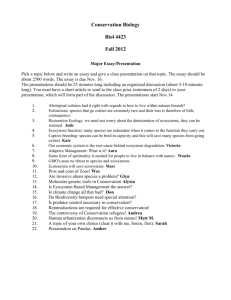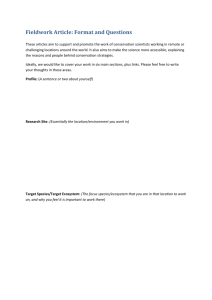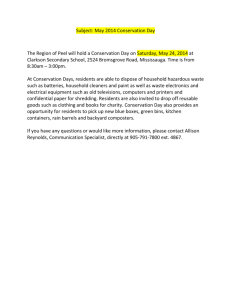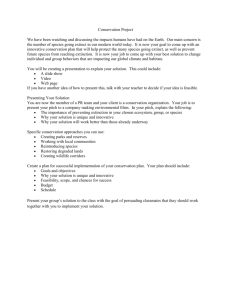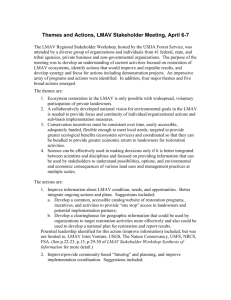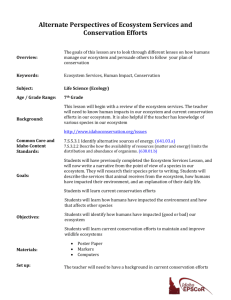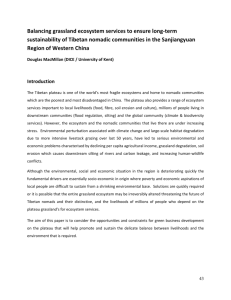ECOLOGY 208, CONSERVATION BIOLOGY, Winter 1997
advertisement
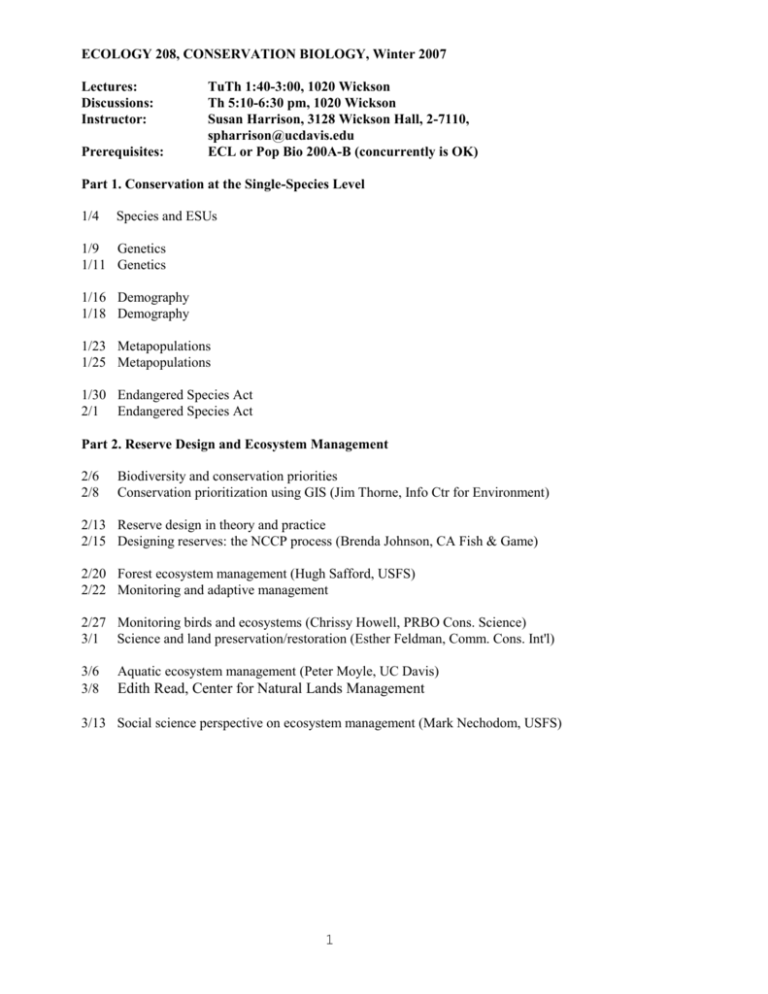
ECOLOGY 208, CONSERVATION BIOLOGY, Winter 2007 Lectures: Discussions: Instructor: Prerequisites: TuTh 1:40-3:00, 1020 Wickson Th 5:10-6:30 pm, 1020 Wickson Susan Harrison, 3128 Wickson Hall, 2-7110, spharrison@ucdavis.edu ECL or Pop Bio 200A-B (concurrently is OK) Part 1. Conservation at the Single-Species Level 1/4 Species and ESUs 1/9 Genetics 1/11 Genetics 1/16 Demography 1/18 Demography 1/23 Metapopulations 1/25 Metapopulations 1/30 Endangered Species Act 2/1 Endangered Species Act Part 2. Reserve Design and Ecosystem Management 2/6 2/8 Biodiversity and conservation priorities Conservation prioritization using GIS (Jim Thorne, Info Ctr for Environment) 2/13 Reserve design in theory and practice 2/15 Designing reserves: the NCCP process (Brenda Johnson, CA Fish & Game) 2/20 Forest ecosystem management (Hugh Safford, USFS) 2/22 Monitoring and adaptive management 2/27 Monitoring birds and ecosystems (Chrissy Howell, PRBO Cons. Science) 3/1 Science and land preservation/restoration (Esther Feldman, Comm. Cons. Int'l) 3/6 3/8 Aquatic ecosystem management (Peter Moyle, UC Davis) Edith Read, Center for Natural Lands Management 3/13 Social science perspective on ecosystem management (Mark Nechodom, USFS) 1 Course Goals This course explores the role of biological research in conservation. Two areas are emphasized: 1) understanding the risks faced by populations of single species; 2) multiple-species conservation issues, such as reserve design and ecosystem management. Rather than conservation information per se, or on environmental politics, the focus is on what scientists can contribute, i.e. on the role biological knowledge plays in identifying and solving conservation problems. As we all know, this is only a limited role, but it's the one we have as biologists, and sometimes it can be very effective. Thus, I’ll be encouraging you throughout the course to focus on the scientific issues. Format The 1 1/2-hour period is intended to allow a one-hour lecture with time for questions. Each Thursday evening will be a student presentation and discussion on a "question of the week" with reference to selected articles from Conservation Biology and other sources. Each student is responsible for co-leading one discussion, and for reading the material in advance and participating in all of the discussions.. Meet with your co-leaders in advance to plan how to guide a lively discussion. One way that often works well is to divide the discussion leaders into two groups, each of whom presents and defends one side of an issue. Grading One exam (60%); daily attendance and participation (40%). NOTE: This means you can get an "A" in the class either by 100% attendance and participation and a score of >85% on your exam; OR by 80% attendance and participation and a perfect exam (100%). The message: attend! participate! The exam is open book, essay style, with 4-6 questions covering the material from my lectures. It will be distributed on March 8 and will be due on the last day of class (March 13, 10:30 a.m.). It will be graded on writing quality as well as content, so please use correct spelling and grammar, complete sentences, and good compositional style. Please use a word processor (no handwritten essays). Studying together is fine, but you’re on your honor to write your answers alone. 2

